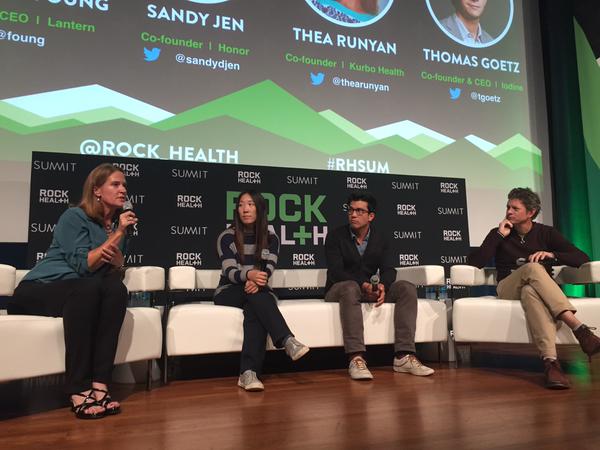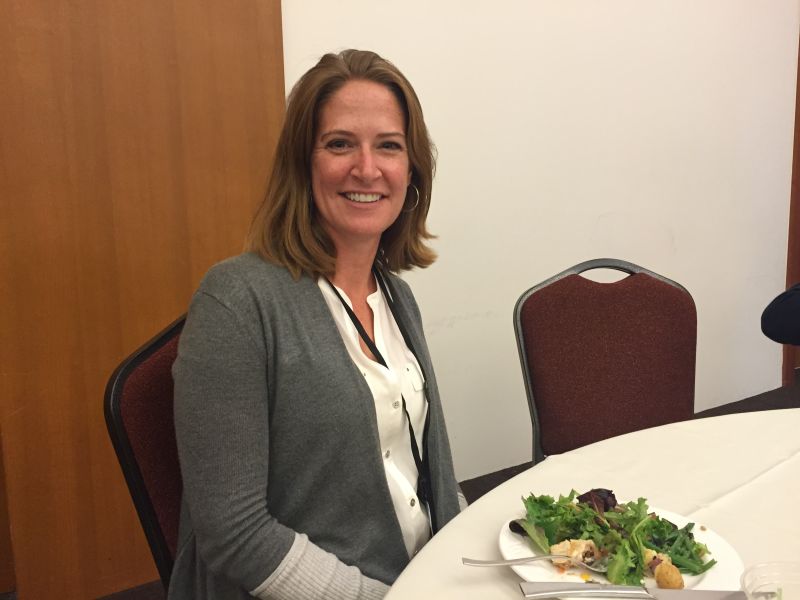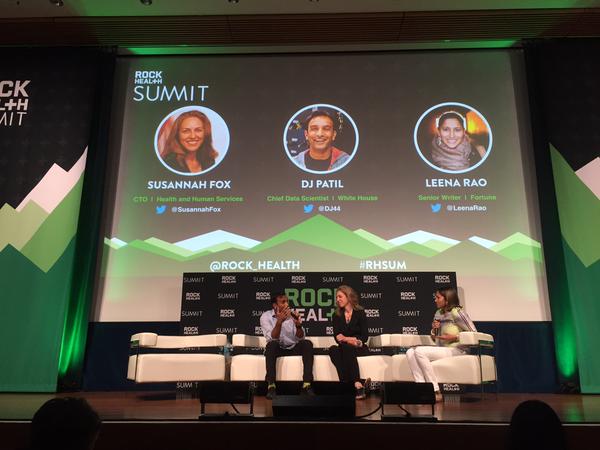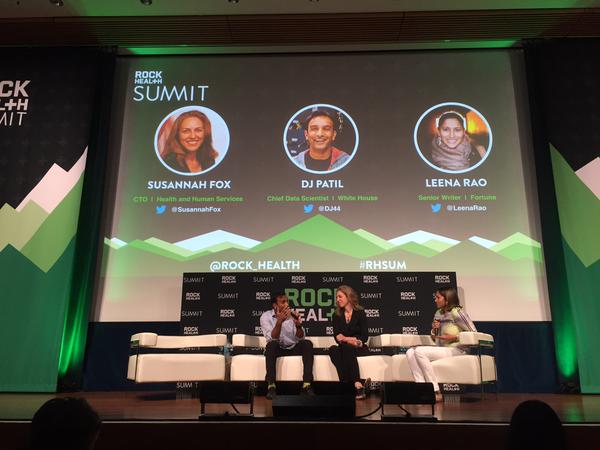Live from the Rock Health 'Digital Health' Summit

The Rock Health Summit in San Francisco draws some of the biggest names in technology and health care, including geneticist Craig Venter, Chief Data Scientist at the White House DJ Patil and Fitbit CEO James Park. Rock Health is a fund for early-stage digital health startups.
The annual conference takes place at UCSF's Mission Bay Conference Center on Tuesday and Wednesday of this week.
In case you're missing it, here are some of the highlights. I'll be updating this post throughout the conference.
Update, 4.15pm Wednesday Sept 30
Former Facebook CFO David Ebersman opened up about his experiences starting a behavioral health company called Lyra Health. Ebersman admitted that the stigma around mental health is still a challenge, but he said we're seeing signs of progress. "Not that long ago," he said, "there was a stigma about cancer."
I'm signing off for tonight, folks. Thanks for following!
Update, 3.30pm Wednesday Sept 30
A group of startup founders, including Collective Health's Ali Diab and Stride Health's Noah Lang, offered some salient advice to would-be health entrepreneurs.
Diab said he spent six months reading about the intricacies of the health sector before starting his company. "Do your homework," he said. "It's not enough to have a great idea." Those who want to succeed in health need to understand the landscape, including the insurance providers, employers, and the regulation.
Lang said it's important to understand the regulation and policies underpinning health care. But he said, "don't rely on that." Policy is liable to change and potentially even get repealed with each new administration.
Update, 2.30pm Wednesday, Sept 30
Molecular-biology pioneer Craig Venter spoke about the power of technology, which is making it cheaper and easier to sequence human genes. Venter was among the first scientists to map the human genome over a decade ago.
He was also the first person to have his genome sequenced, and learned that he was at a high risk for melanoma. Venter had a scare a few years back, but had the melanoma removed before it had a chance to spread.
Venter is currently working on extending the human life span through his company Human Longevity Inc. Much of this work involves collecting human genetic data. "We are trying to have the richest sources of all diseases that we can," he said. Read more here about Venter's work.
For Venter, a big focus is on building a massive data-set and testing scientific assumptions about genetic associations. "There is so much useless and wrong information about genetics in the literature," he said.
I enjoyed hearing Venter deliberate on the future of privacy and security when it comes to our genetic information. Venter implied that it would not be feasible to "de-identify" your genetic blueprint (his lab is looking into predicting a person's face shape from a voice recording alone). But he did say security will become more important, and that it's not a good idea to share your DNA on the Internet.
In an interview with KQED's Senior Science Editor Andrea Kissack, Venter urged people to get their exome sequenced, which costs about $250. "That's less than a month of cable," he said.
Update, 1.30pm Wednesday, Sept. 30

I spoke with Thea Runyan, cofounder of Kurbo Health, over a nutritious lunch. Runyan's startup Kurbo Health is a coaching and weight loss app for kids.
Her advice for healthy eating: Unlimited fruits and vegetables, and avoid "red light" foods, like ice cream. She doesn't think that activity-tracking wearables for kids are the answer to the childhood obesity epidemic. "Most end up in a drawer," she said.
Update, 11am Wednesday, Sept. 30: James Park, CEO of wearables maker Fitbit admits that the company "pioneered the art of shipping late hardware products." The company got its start in 2007, showed off a demo at TechCrunch's Disrupt conference in 2008, but didn't ship its first product until September of 2009.

I'm expecting some exciting new products from Fitbit in the coming years. Park said the company now spends $100 million on research and development: about two-thirds for software development, and the remaining one-third for hardware.
Evolent Health's CEO Frank Williams offered some interesting tidbits about cultivating company culture. Williams said on the day of the company's initial public offering, or IPO, he made eggs and pancakes for employees at the San Francisco offices. He said transparency is key for a health care business: There's no shame in speaking honestly about the potential pitfalls, as well as the opportunities.
Fitbit's CEO offered some rare insight into the IPO, which performed better than analysts and Wall Street expected. He said he had fast food from Smashburger delivered to the corporate jet when making the rounds during the roadshow!

Update, 5pm Tuesday, Sept. 29: Venture capitalist Chamath Palihapitiya brought the house down with a rallying cry for Silicon Valley's top investors to fund ambitious health care companies. He joked that startups that deliver brownies in the middle of the night have a better shot at procuring investment than new ventures tackling cancer and diabetes.
When asked about whether he saw a "Facebook-sized opportunity" in health care, he immediately quipped "bigger." Palihapitiya previously worked at Facebook before starting a fund called Social Capital. He started investing in health care after watching numerous family members get diagnosed with diabetes.
I was impressed with Palihapitiya's longer-term investment vision. Unlike most investors, he's not chasing the easy wins and is willing to wait a decade or more to see a big return.
Rock Health cofounder Halle Tecco backstage said Palihapitiya has a unique investment thesis that doesn't mirror most of Silicon Valley. She said that Rock Health takes pains to select conference speakers who are "big thinkers, not just focused on incremental change."
I'm signing off for tonight. Tune in to the same URL for live updates!
Update, 4:00 p.m. Tuesday, Sept. 29: Adam Gazzaley, cognitive neuroscientist at UCSF, spoke on-stage about the transformative potential of virtual reality goggles in health care:
"Augmented reality could be the next platform in five or ten years out. The potential is really profound when it comes to the brain. As the entertainment world increases affordability, I think we'll see a globalization of this whole field.
He also commented on the potential of gaming for the aging population:
"If you can train the brain through experience, through interactivity with gameplay, we have shown that we can reversing several of the neural and behavioral and cognitive changes associated with aging. We do look at these tools as powerful digital medicines or wellness tools." I recently interviewed Gazzaley for KQED. Read more here!
Mary Spio, founder and president of Next Galaxy spoke about bringing augmented reality to kids and people with disabilities:
"People in wheelchairs tried [virtual reality headsets] and experienced sensations like they were flying and walking. We also see potential to bring these headsets into schools as a required part of the curriculum."
One of my favorite quotes of the afternoon comes from Sandy Jen, cofounder of Honor, in-home senior care startup Honor. Jen spoke about the limitations of technology in health care:
"The important part of what we do is building relationships. Tech can't replace a human bond."
Update, 3:00 p.m. Tuesday, Sept. 29:

White House CTO DJ Patil pushed for more technology experts in health care:
"If we have a constitutional law professor [President Obama] who is tech-minded, we can do it for health care. The CEOs need to become technologists and we have to help them." Patil said Silicon Valley has a thing or two to learn from the White House, including how to hire a diverse workforce.
Department of Health and Human Services' (HHS) Susannah Fox on broaching conversations about Healthcare.gov, the federal website for consumers' to shop for health insurance, which was plagued with errors when it initially launched:
"Talking about healthcare.gov at HHS is like saying 'Lord Voldemort.' I'm going to say that word. Brace yourselves." But Fox stressed that HHS has a slew of innovative projects in the works, including its IDEA Lab.